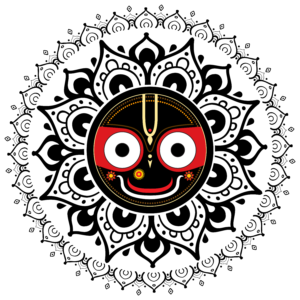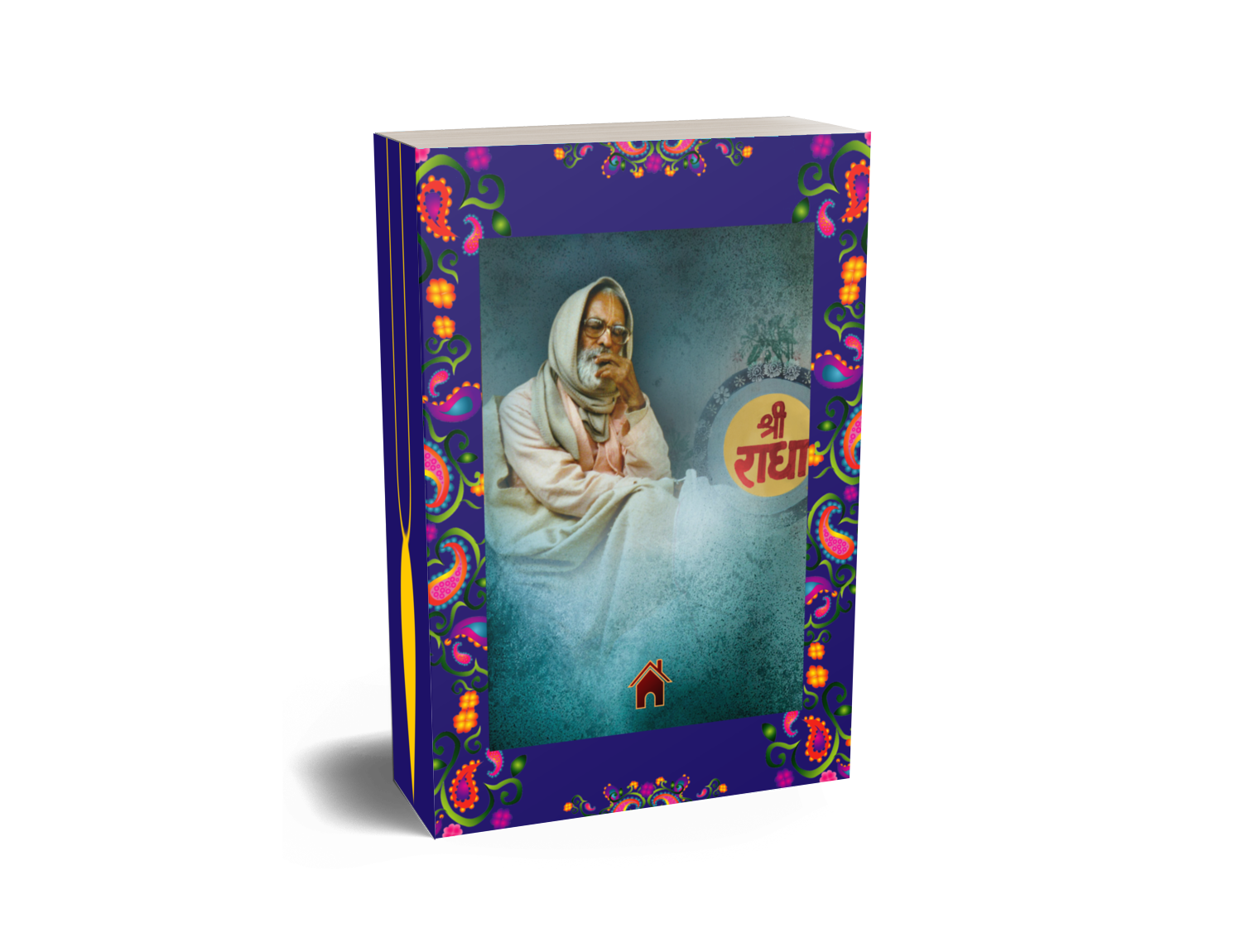

The following is a transcription of a discourse delivered by Śrīla Bhaktivedānta Nārāyaṇa Mahārāja in Hong Kong, on April 13, 2008
Today is a special and very sacred day. Today, Kṛṣṇa, in the form of Rāmacandra, took birth in Ayodhyā.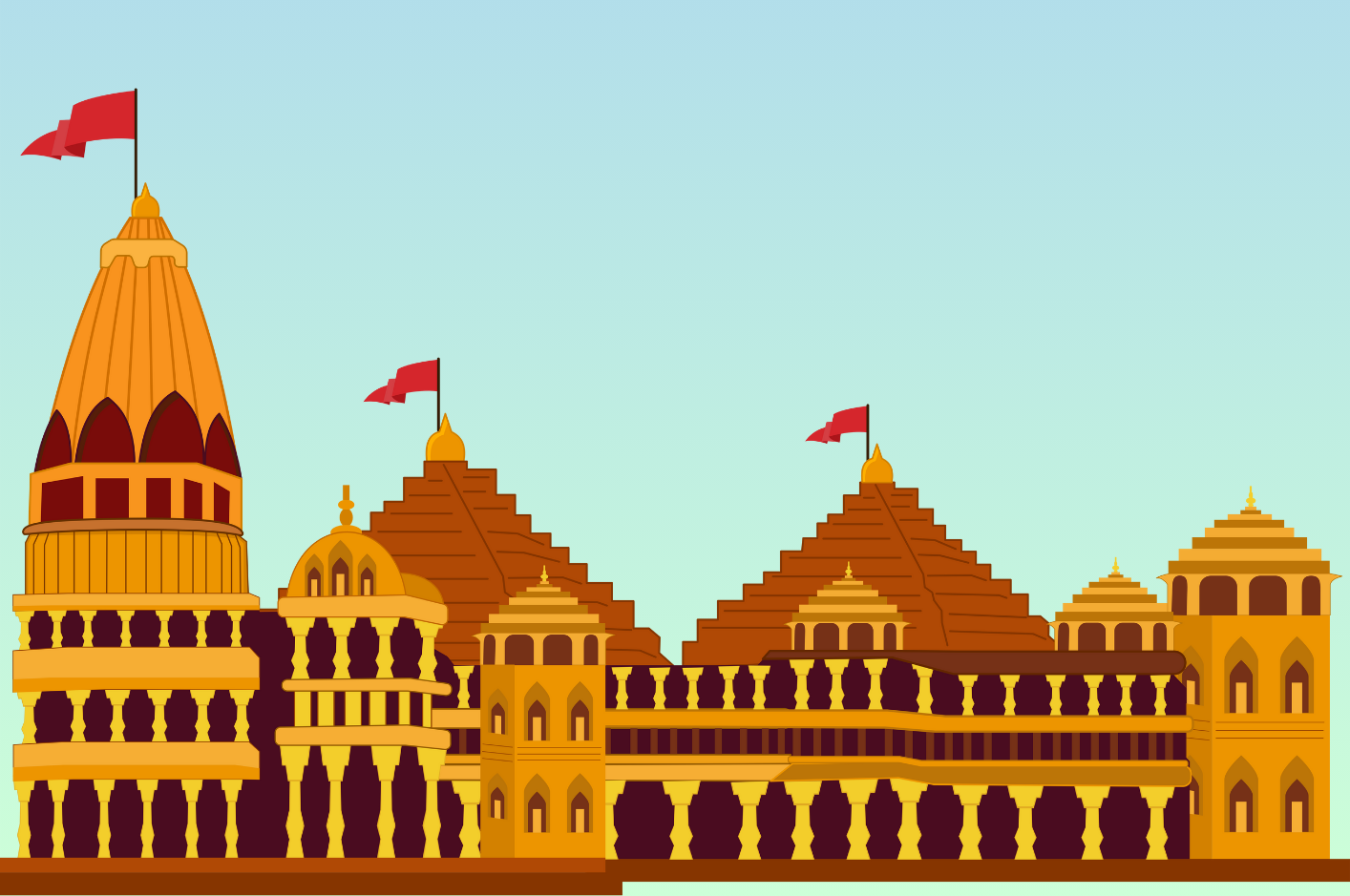
In ancient times there was a king named Mahārāja Daśaratha. He was a very, very strong personality. He conquered all kings in the South, North, East, West, and everywhere. Therefore his name was Daśa-ratha, meaning that his chariot went everywhere in the ten directions – up, down, here, here, here. He had 360 wives, but no child, no son. Now, half of his life was finished and he was becoming old. Because he had no son, he was very anxious.
One day he went hunting. The whole day he was roaming here and there, and it became night. Now he was very hungry and thirsty, and he wanted to take shelter somewhere for the night. His friend King Kaikeya, the father of Kaikeyī, lived nearby, so he went there. When he arrived, King Kaikeya became very happy. King Kaikeya told his young daughter, “O my dear daughter Kaikeyī, take care of Mahārāja Daśaratha and manage his meals so that he will be happy here.” Kaikeyī was very beautiful and very qualified. She served Mahārāja Daśaratha in such a way that he became very, very happy.
In the morning, Mahārāja Daśaratha went to Mahārāja Kaikeya and asked his permission to return to his kingdom, Ayodhyā. He also said, “O my brother-king, my friend-king, your daughter served me in such a way that I’m so much happy. So, I request that you marry your daughter to me.” King Kaikeya began to laugh. “I cannot give my daughter to you for marriage. I know that you have so many queens. I will give my daughter to any king, under the condition that the son born from her womb will be the next king. Then I can give her; otherwise not.” Hearing this, Mahārāja Daśaratha began to laugh. He said, “O my friend, I have 360 queens but no son. If your daughter will give me a son, automatically he will be my successor king. Don’t worry about this. I will be very lucky if I will have a son by Kaikeyī.” King Kaikeya then gave his daughter in marriage to Mahārāja Daśaratha, and Mahārāja Daśaratha returned to Ayodhyā with her.
After some time, demigods called Mahārāja Daśaratha and told him, “You are very powerful. We want to make 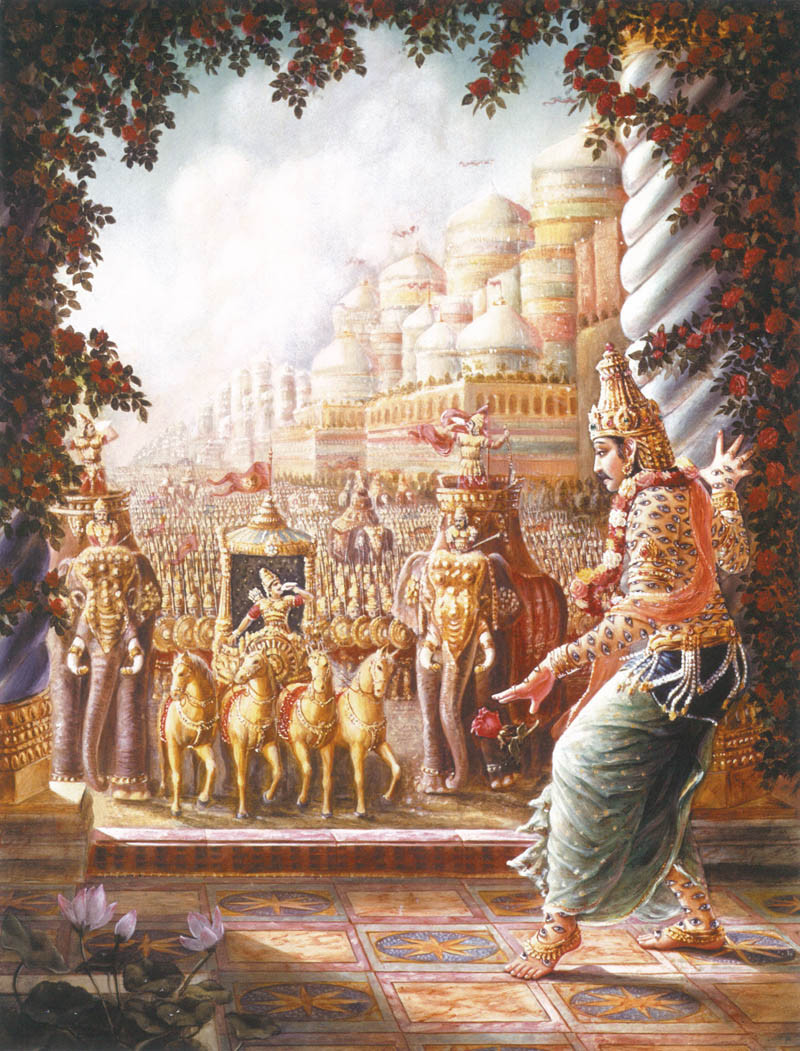 you commander-in-chief of our army to defeat the demons.” So, Mahārāja Daśaratha went to heaven, and Kaikeyī also went with him. He became the commander-in-chief of the demigods’ army and began to fight with the demons, with Kaikeyī as his charioteer. She was very, very brave and powerful.
you commander-in-chief of our army to defeat the demons.” So, Mahārāja Daśaratha went to heaven, and Kaikeyī also went with him. He became the commander-in-chief of the demigods’ army and began to fight with the demons, with Kaikeyī as his charioteer. She was very, very brave and powerful.
One day while he was in battle, the axel of his chariot broke. Kaikeyī jumped down from the chariot, took that chariot with her hand, and Mahārāja Daśaratha defeated the demons. After the battle, Mahārāja Daśaratha was very happy. He said to Kaikeyī, “You have saved me. Because of you, I have won the battle. Now ask for two boons; I want to fulfil your desires.” Kaikeyī replied, “I am your wife. It was my duty to serve you like this; there is no need of any boon.” Again and again Mahārāja Daśaratha insisted, “You must take two boons. First, you were my charioteer, and second, you lifted the chariot. So, you must have two boons.” She replied, “When the proper time comes, I will ask for these boons. Keep them as a deposit.”
After that, Mahārāja Daśaratha returned to Ayodhyā, but still he had no son. He therefore engaged Ṛṣi Śṛṅga in 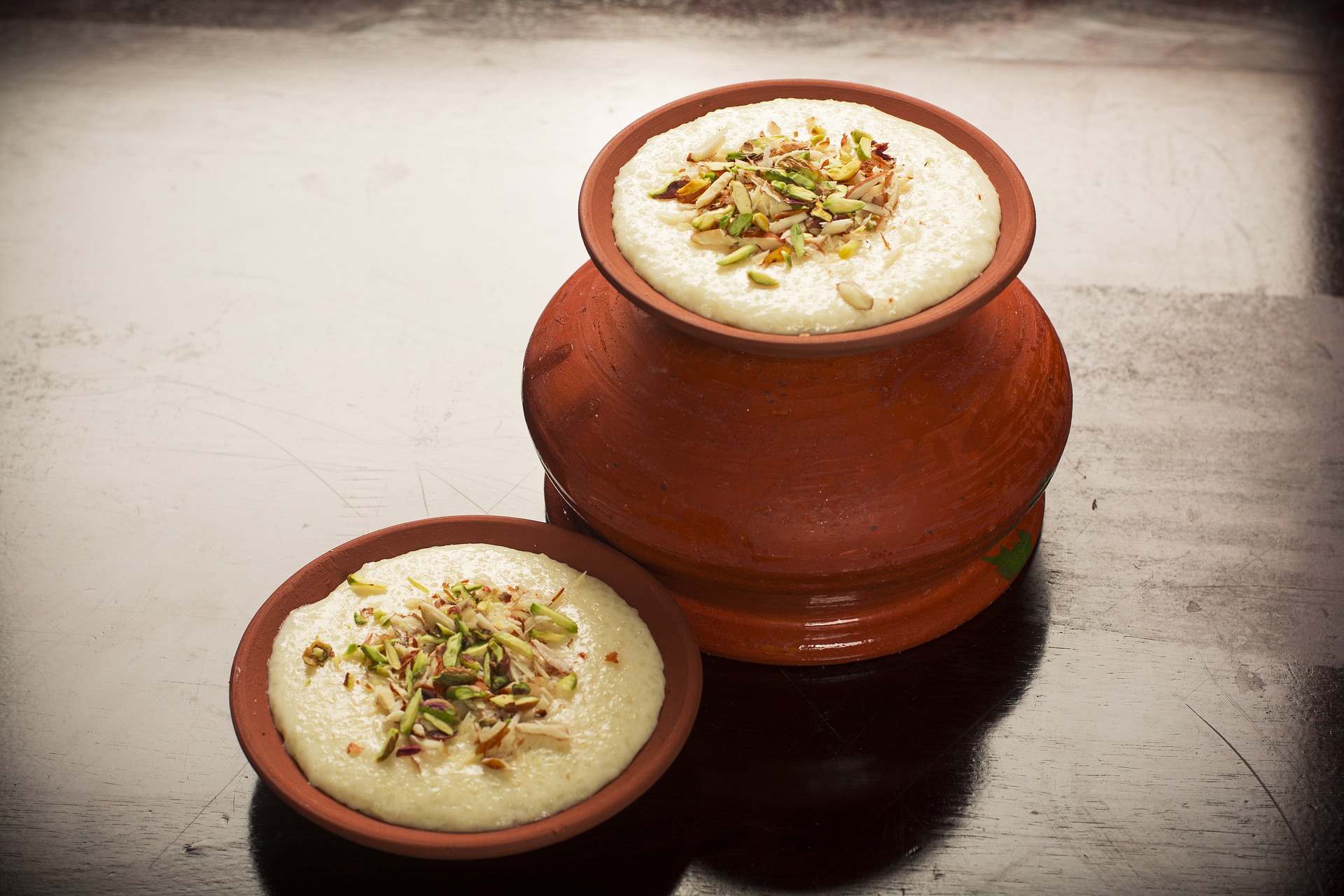 a putreṣṭhi-yajña, a fire sacrifice for begetting a child. When the sacrifice was completed, a deity came out from the sacrificial fire and gave some sweet rice to Mahārāja Daśaratha. The deity said, “Give this sweet rice to any of your queens, and they will definitely have sons.”
a putreṣṭhi-yajña, a fire sacrifice for begetting a child. When the sacrifice was completed, a deity came out from the sacrificial fire and gave some sweet rice to Mahārāja Daśaratha. The deity said, “Give this sweet rice to any of your queens, and they will definitely have sons.”
Mahārāja Daśaratha became very pleased. He divided the sweet rice in half. He gave half to Kauśalyā, and half to Kaikeyī. Kauśalyā and Kaikeyī then divided their portions and gave some of each to Sumitrā. Rāma took birth from the womb of Kauśalyā; from Kaikeyī came Bharata; and from Sumitrā came Lakṣmaṇa and Śatrughna.
You should know that neither Kṛṣṇa, nor Rāma, nor any incarnation of Kṛṣṇa comes from a husband and wife, 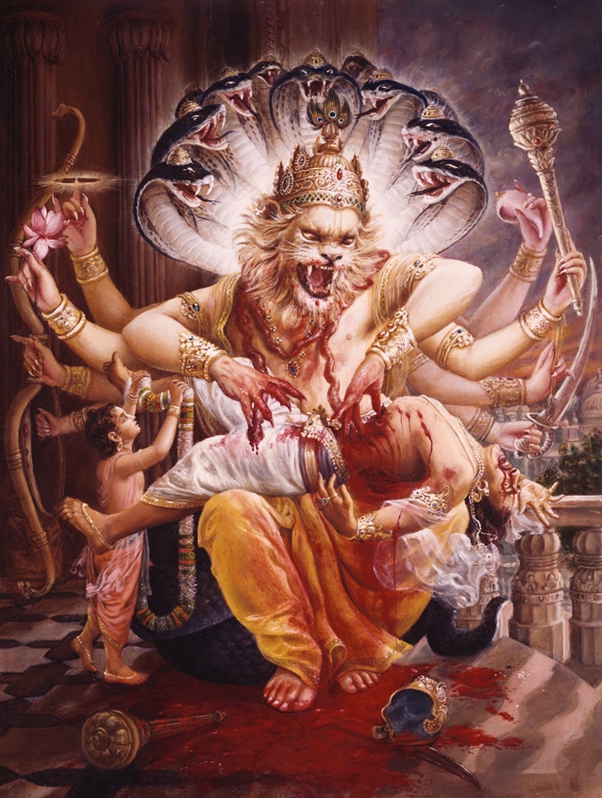 like a worldly person. That is why the fire sacrifice was done – and through the sweet rice, Kṛṣṇa Himself came in the form of Rāma. Understand? The fire sacrifice was performed to show that Rāma is not like us – taking birth from a father and mother. Regarding Kṛṣṇa, He entered by mantra in the heart of Mahārāja Nanda, and Nanda gave the mantra to Yaśodā. Nṛsiṁhadeva, Varāhadeva, and other incarnations also – none of Them came from a father and mother.
like a worldly person. That is why the fire sacrifice was done – and through the sweet rice, Kṛṣṇa Himself came in the form of Rāma. Understand? The fire sacrifice was performed to show that Rāma is not like us – taking birth from a father and mother. Regarding Kṛṣṇa, He entered by mantra in the heart of Mahārāja Nanda, and Nanda gave the mantra to Yaśodā. Nṛsiṁhadeva, Varāhadeva, and other incarnations also – none of Them came from a father and mother.
After some time, the sons of Mahārāja Daśaratha were sent to the gurukula of Vasiṣṭhadeva, where they became experts in all sixty-four arts and then returned to Ayodhyā. Sometime later, Mahāṛṣi Viśvāmitra visited Mahārāja Daśaratha and said, “While we are performing sacrifices, the demons are destroying them. So, please give me Rāma and Lakṣmaṇa. They will protect us.” Mahārāja Daśaratha replied, “Oh, they are only teenagers. I will go with my whole army to protect you.” Viśvāmitra said, “You cannot; I know. Give them to me; otherwise, I will curse you.” Mahāṛṣi Vasiṣṭha, the guru of Mahārāja Daśaratha then said, “O Mahārāja Daśaratha , if you give Them, They will learn so many things and They will be very happy.” Thus, Mahārāja Daśaratha gave his sons.
Viśvāmitra brought Rāmacandra and Lakṣmaṇa to his āśrama on the bank of the Ganges, where my birthplace is. He taught Them about many weapons and mantras, and Rāmacandra killed so many demons there. Mārīca was one of those demons. By one of Rāmacandra’s arrows, he was hurled 800 miles into the ocean near 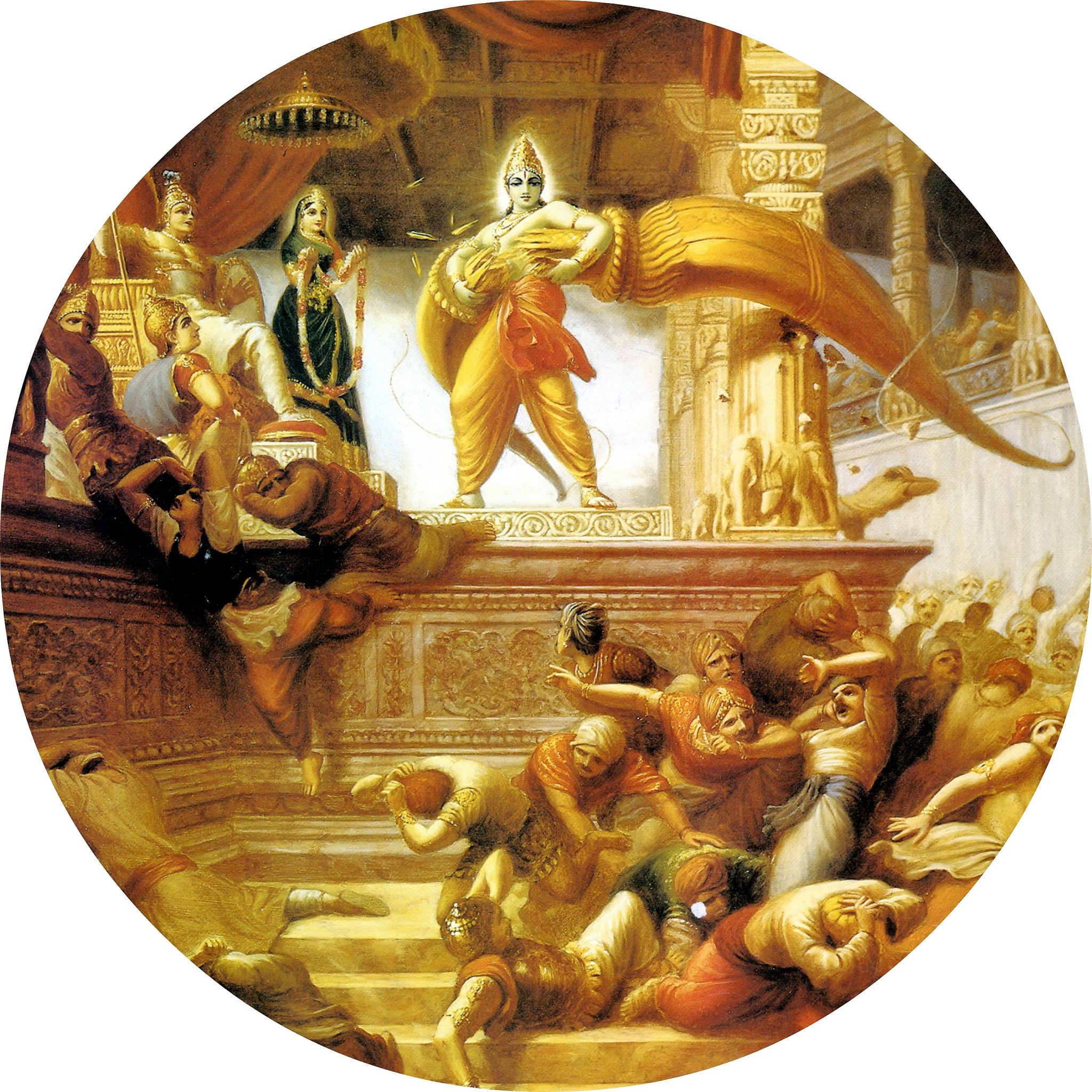 Laṅkā.
Laṅkā.
[Janaka Mahārāja invited many kings who came to Janaka-purī to compete for the hand of his daughter, Sītā.] He announced in the assembly of kings, “Whoever will string this bow of Śaṅkara, I will marry my daughter to that person.” The bow of Śaṅkara which was so heavy that very strong kings could not pick it up. Even Rāvaṇa came at night to try; Bāṇāsura came; demigods came; but they could not do it. So many kings from all over the world had come to Janak-purī and wanted to lift it, but they could not.
Rāmacandra was also now in Janaka-purī, with Viśvāmitra and Lakṣmaṇa. All three were now present in that assembly. At last, by the order of Viśvāmitra, Rāmacandra very easily lifted that bow and began to string it. At once, that bow broke, and Sītā-devī was thus married to Śrī Rāmacandra.
Mahārāja Daśaratha was invited from Ayodhyā. He came with Bharata, Śatrughna, Brahmarṣi Vasiṣṭha, and so many important persons from Ayodhyā. Then Rāma, Lakṣmaṇa, Bharata, and Śatrughna were married. After that, they all returned to Ayodhyā [with their brides].
After some time, Bharata and Śatrughna went to visit Mahārāja Kaikeya. Meanwhile, Daśaratha called the family and said, “Now I am becoming old. I know my son Rāma is very much qualified to be king after me – my successor. I want to give Him the post of crown prince.” Mahārāja Vasiṣṭha and all persons in the counsel became very happy. They said, “O Mahārāja Daśaratha, don’t delay.” He asked, “When should I make Him king?” Brahmarṣi Vasiṣṭha replied, “Tomorrow is a very auspicious day. All the stars are very favourable. Tomorrow it should be done.” So Mahārāja Daśaratha declared, “Tomorrow I will make Rāma the crown prince.” Thus, Mahārāja Daśaratha told Vasiṣṭha, “Prepare all things for the abhiṣeka of Rāma.” All became very happy.
In the meantime, the maidservant of Kaikeyī went to Kaikeyī and said, “Really, you are very unfortunate. Tomorrow, Mahārāṇī Kauśalyā will become Rājā-mātā, mother of the king, and you will be Kauśalyā’s maidservant.” When Kaikeyī heard this, she became very happy. She offered her golden necklace to that maidservant, but her maidservant took it and threw it away.
The maidservant said, “You are really very foolish; you are not understanding. Rāma will be king, and Bharata will be His servant. Then, you will be the mother of a servant. Still, there is some way out. Why has Daśaratha sent Bharata and Śatrughna from here? In their absence, why has he declared that Rāma will be the next king? You remember Mahārāja Daśaratha promised that the son from your womb would be king. So, why is He not doing so? Also, you have two boons from Mahārāja Daśaratha. You should tell him that your son will be the king, and Rāmacandra will go into exile.”
Thus influenced, Kaikeyī thought, “If Rāma is here, no one will accept Bharata as king. So, He must be sent into exile.” She took off all of her ornaments, donned very dirty clothes, and wept. She sent someone to Mahārāja Daśaratha to tell him that she was weeping. Mahārāja Daśaratha then came to his dear wife. He wanted to know why she was weeping and why she was wearing dirty clothes. She said, “Do you remember that you gave me two boons? I want to ask for them now; it is the proper time for me.” Mahārāja Daśaratha replied, “I can give them to you.” She said, “Bharata should be king, and Rāma should be exiled for fourteen years.”
Hearing this, Mahārāja Daśaratha became faint and began to weep. He said, “O Kaikeyī, I can make Bharata king, my successor, but why do you want Rāma to go into exile? Why do you want to send Him away? Kaikeyī replied, “You should just now promise that you will do these things. I don’t want to hear anything else.” Worried 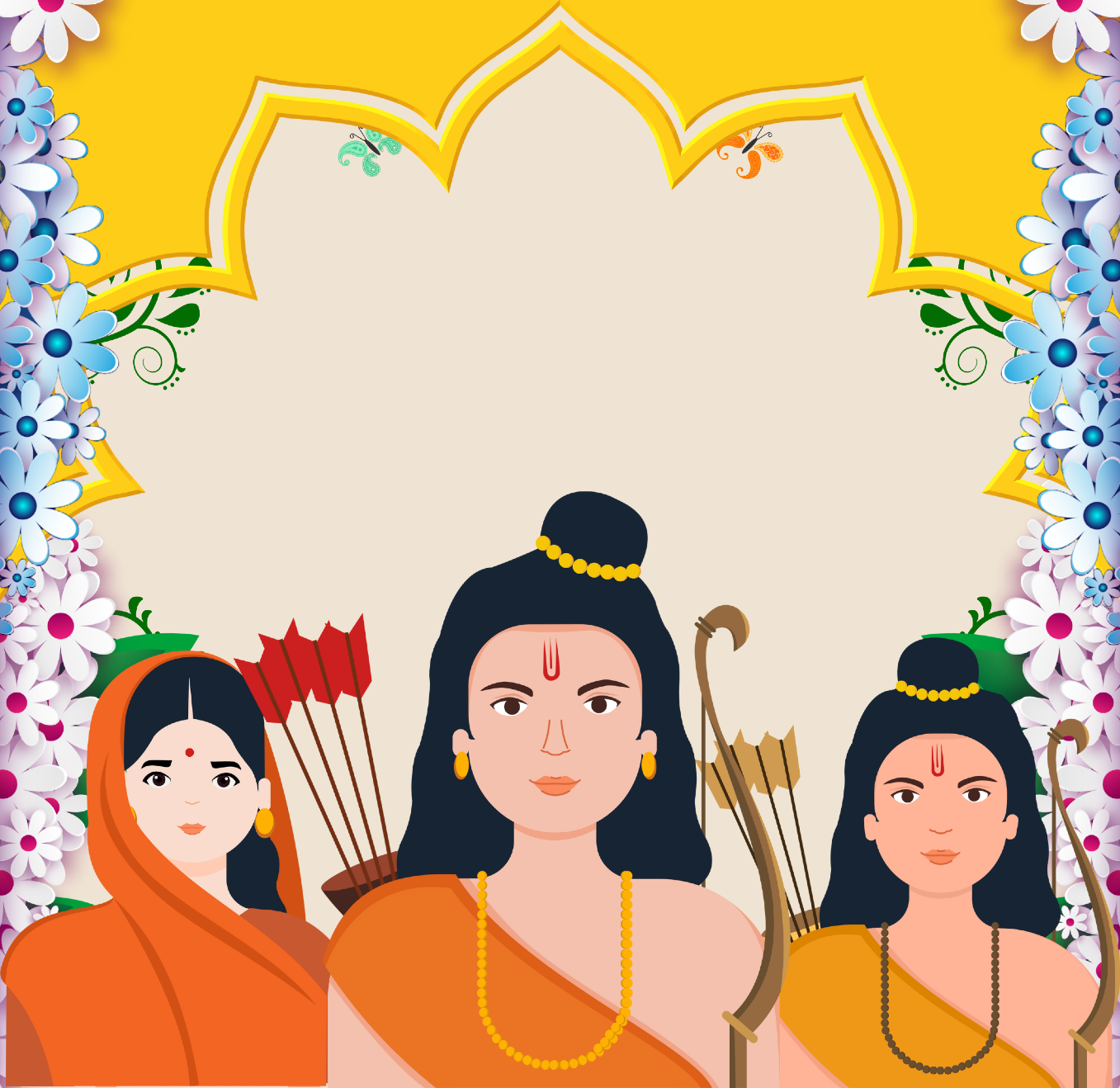 and weeping, Mahārāja Daśaratha said, “My dear Kaikeyī, don’t send Rāma into exile,” But she would not change her mind.
and weeping, Mahārāja Daśaratha said, “My dear Kaikeyī, don’t send Rāma into exile,” But she would not change her mind.
Kaikeyī called Śrī Rāma. Rāma asked, “Why is my father not speaking, and why is he crying?” She replied, “He has given me two boons. I asked that Bharata be king and that You should go into exile for fourteen years.” Rāmacandra became very happy, and said, “From the beginning, I was wondering why, in Indian culture, the eldest son becomes king? Why should it not be divided among all his brothers? I’m happy that you have now asked for this boon from Mahārāja Daśaratha. At once I am going into exile.”
When He was ready, Sītā-devī said, “I must go with you; I will not be able to survive here.” Lakṣmaṇa also said, “I must go with You.” So, the three of them, in the dress of sannyāsīs, went into exile.
I am telling this very briefly.
When Rāmacandra went into exile, Mahārāja Daśaratha, weeping, told Kaikeyī, “I have now broken my relation with you as my wife; now you are no longer my wife. Moreover, if Bharata comes and accepts the kingdom, I also will reject him as my son. Take me to the palace of Kauśalyā.” There, crying, “Rāma, Rāma and Rā…!” he left his body.
In the meantime, Brahmarṣi Vasiṣṭha called Bharata and Śatrughna from their maternal uncle’s house. When they came, they saw that all the citizens of Ayodhyā were weeping as a widow would weep. Bharata saw that his mother Kaikeyī was wearing a white dress. He asked her, “Where is my father?” She replied, “He has left his body.” He asked, “Where is Rāma?” She replied, “He has gone into exile.” He asked, “Where are Sītā and Lakṣmaṇa?” She replied, “Also in exile.” He asked, “Why?” She replied, “I have done this for you so that you could be King of Ayodhyā.” He replied, “I would cut your head off, but my brother Rāma would not be happy, so I will not do so. I accept you as a queen, but now you are not my mother.”
Bharata then called the council and said, “Be ready. I am going to Citrakūṭa where my brother Rāma is staying with Lakṣmaṇa and Sītā. I will bring Rāma back and He will be the king; He is still king.” Thus, he prepared to leave with all of the mothers.
When they were getting ready to go, Kaikeyī told Kauśalyā, “Sister, I also want to go. I will tell Rāma that I am taking back my boon and that He must return to Ayodhyā and be king. So, take me with you.”
Out of mercy, Kauśalyā took Kaikeyī with her, and all went to Citrakūṭa. There, they requested Rāmacandra, “Please return to Ayodhyā.” Rāmacandra heard from them that His father had departed from this world. So, first He performed a ritual ceremony, and then a big counsel took place. Vasiṣṭha Mahāṛṣi and all ṛṣis were on one side. The father of Jānakī, Janaka Mahārāja, was also present as the head of the family. Rāma, Lakṣmaṇa, Sītā, and others were on another side.
Vasiṣṭha Ṛṣi said, “O Mahārāja Janaka, I’m very happy that you have come. The boat of Ayodhyā is sinking in the ocean; there is no captain to save us. I am happy that now you have come. Tell Rāma and Bharata what to do. I cannot tell them, because I am on the side of Bharata, that Rāma should return. So, you say what they should do.” Then Mahārāja Janaka asked Rāma, “Will you agree that what I decide You will follow?” Rāma replied, “Yes, certainly; you are my father and like my guru.” Then Mahārāja Janaka asked Bharata, “Will you obey me?” Bharata replied, “Certainly, You are my father now, and like my guru also. I will do what you decide.”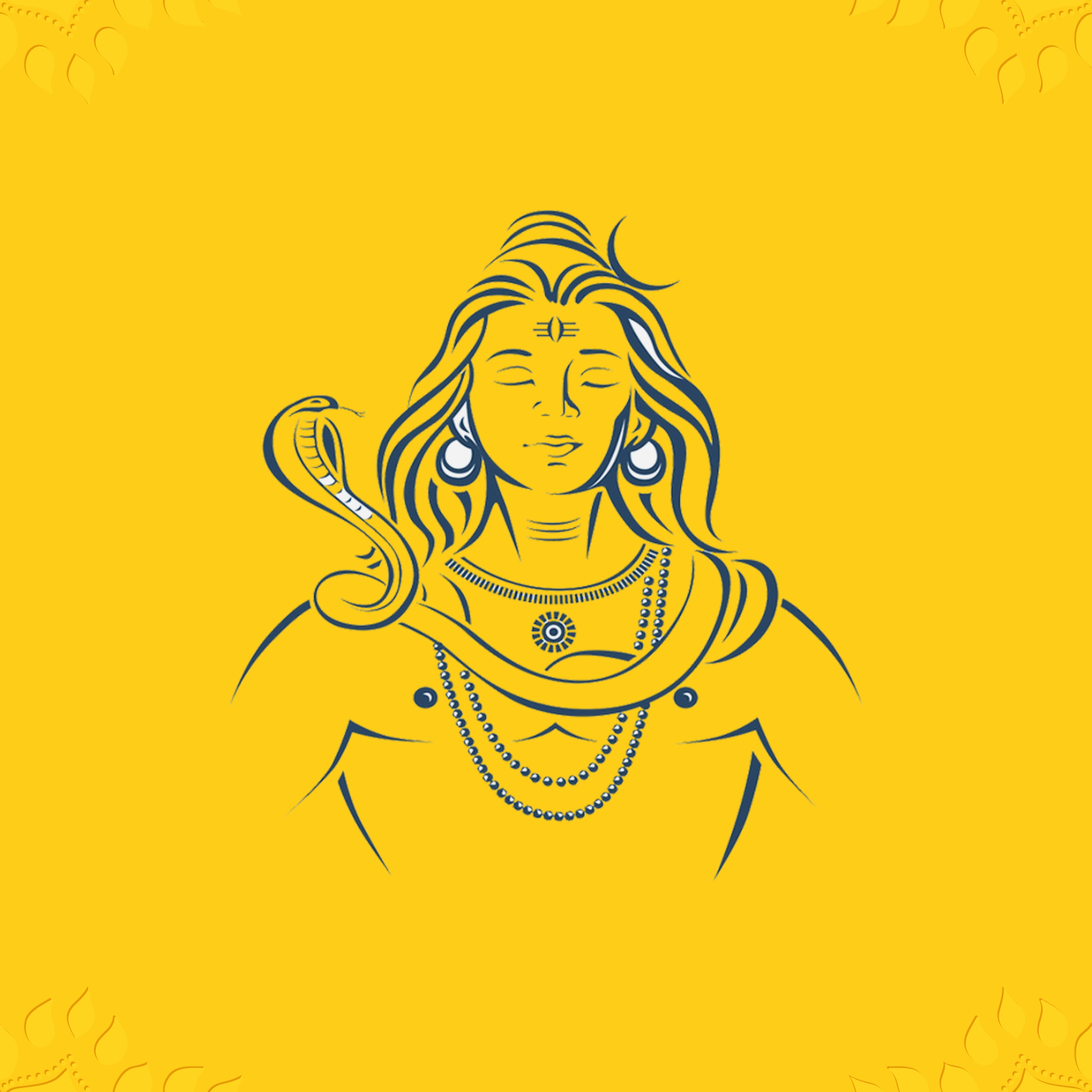
In that big counsel, Bharata explained why he thought it better that Rāma return to Ayodhyā. Mahārāja Janaka then offered praṇāma to his gurudeva, Śaṅkara, and meditated on him. He said, “O Śaṅkara, my Gurudeva, inspire me. What should I tell them?”
After that, having received inspiration from Bhagavān Śaṅkara, Mahārāja Janaka said, “Bharata has won, and Rāma has been defeated. The love and affection of Bharata is very, very deep, like an ocean, and Rāmacandra’s dharma is like the Himālayas. Rāmacandra can sink in the ocean of Bharata’s love and affection, but He cannot move here and there. This means that Bharata should think about what real bhakti is, uttama-bhakti. Though he has won, he should ask his worshipful Deity how He will be pleased – what He wants – and follow that.
Bharata then became very happy. He folded his hands before Mahārāja Janaka and said, “Mahārāja Janaka, you are really my guru. You have opened my eyes. Until now, I was looking toward my own happiness. I was thinking that if Rāma would come to Ayodhyā I would be happy. I never thought about how Rāma would be happy. Now you have opened my eyes.”
Bharata said to Rāma, “My dear brother Rāma, how will You be happy? Tell me what You want.” Rāma replied, “I am defeated; you have won. So I am taking the kingdom of Ayodhyā. But I want that for fourteen years you will manage My kingdom – not your kingdom – as My representative. After fourteen years, I will definitely come and take My kingdom.” Bharata agreed. He took Rāma’s wooden sandals, placed them on his head and returned to Ayodhyā.
Śrī Rāmacandra thought, “This place is very near to Ayodhyā. Bharata or other inhabitants of Ayodhyā may come here, and then the ṛṣis will be disturbed. So, I must go to the deep forest.” Thus, He went to Daṇḍakāraṇya, and then Pañcavaṭī. In Pañcavaṭī, He made a cottage on the bank of the Godāvarī and began to live there.
One day, Rāvaṇa’s sister Śūrpaṇakhā came. She saw Rāma, became so much attached, and wanted to marry him. She took the form of a very beautiful lady and approached him. She said, “I am a very young, qualified, beautiful lady and you are a young, attractive person. I want to marry you.” Rāmacandra replied, “I am married, and Sītā is here. Lakṣmaṇa has no wife here, so you can go to him.” Then she went to Lakṣmaṇa, who told her, “I am His servant. Do you want to be the maidservant of that lady (Sītā)? So, go to Rāma. He can marry you.”
Again she went to Rāma, and again He refused. Then she took the form of a very big demon, and wanted to kill and eat Sītā. Then Lakṣmaṇa, by the order of Rāma, cut off her nose and ears. Crying, Śūrpaṇakhā went to Rāvaṇa’s brothers, who came with an army to fight with Rāma. Rāma killed them all.
Rāmacandra then told Sītā, “I want to fight with the demons and kill them. I want to keep you with the demigod of fire. You will be safe there.” Rāma called the deity of fire and Sītā was given to him. Then a Māyā-Sītā continued with Śrī Rāmacandra.
Śūrpaṇakhā went to her brother, the very powerful Rāvaṇa. She said, “I went to the forest and saw a very beautiful lady. Really, she is very qualified to be your queen. She is more beautiful than your wife Mandodarī. But 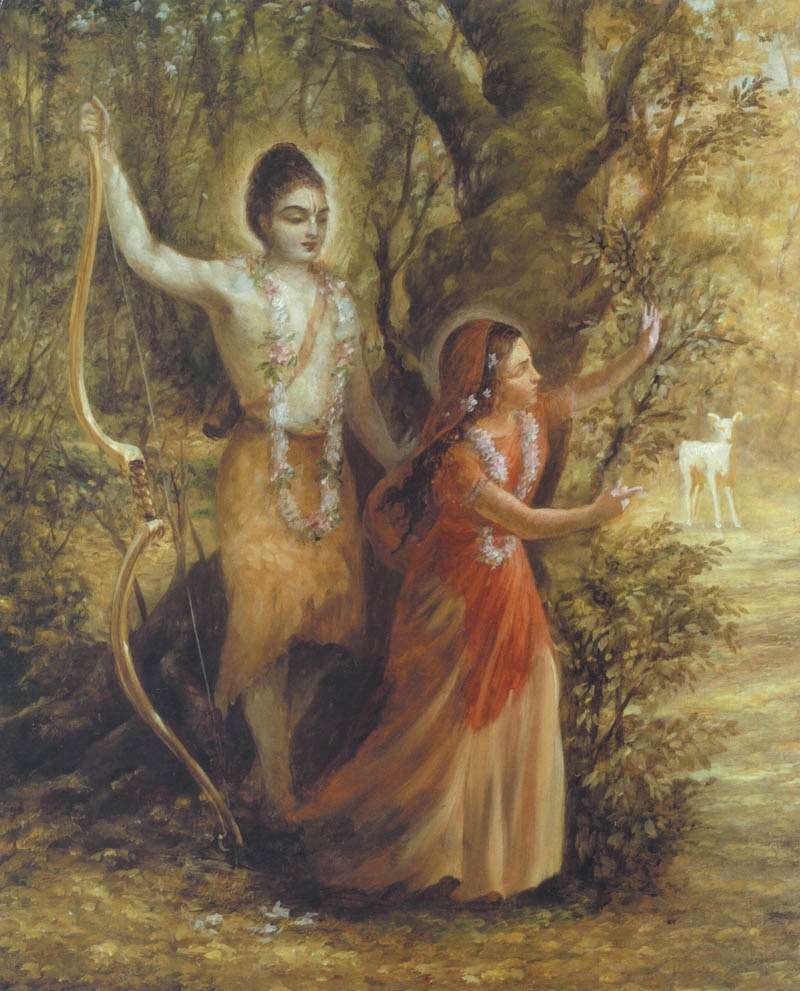 when I went there, they cut off my nose and ears. I want you to take revenge, and somehow take Sītā and make her queen here.”
when I went there, they cut off my nose and ears. I want you to take revenge, and somehow take Sītā and make her queen here.”
Rāvaṇa then took one of his servants, Mārīca with him and went to Daṇḍakāraṇya, near Pañcavaṭī. He was on a flower aeroplane, which he had taken from Kuvera. He told Mārīca, “Take the form of a very golden deer and go in front of Sītā and Rāma. Sītā will definitely tell them to bring her that deer. Rāma will follow you, and you take Him very far away. When Rāma kills you, at that time imitating the voice of Rāma, you should say, “Alas Lakṣmaṇa! Alas Lakṣmaṇa!”
Mārīca became a golden deer and began grazing in front of Sītā and Rāma. Sītā-devī said, “That golden deer is very dear to me. Prabhu, my dear husband Rāma, somehow bring that deer to me, either alive or dead. I will present it to Mother Kaikeyī.”
Rāma had told Lakṣmaṇa before going, “Stay here and protect Sītā. There are so many demons, so you must stay here; don’t come with Me.” Rāma followed that deer who took Him very far away. When Rāmacandra shot that deer, the deer cried [imitating Rāmacandra’s voice], “Lakṣmaṇa, Lakṣmaṇa! Save me, save me!”
Sītā-devī and Lakṣmaṇa heard this voice. Sītā-devī said, “Go and help your brother; otherwise, He will be put to death.” Lakṣmaṇa replied, “I know my brother. No one can kill or defeat Him. So I will not go. Rāmacandra has given me the order to stay here and protect you.” Sītā-devī said, “Oh, you are a hypocrite. You are a spy. You want Rāma to be killed so you can become my husband. This can never be.” Lakṣmaṇa became very worried and said, “I am making a circle around this cottage. Don’t cross this circle [for any reason]. Stay there. I am going, but don’t go out of the circle.”
In the meantime, Rāvaṇa went there in the form of a tridaṇḍī-svāmī, and called out, “Bhikṣām dehi, bhikṣām dehi (give me alms).” Sītā-devī brought him something on a plate. Rāvaṇa tried to enter that cottage, but when he approached the circle made by Lakṣmaṇa, some flame or electricity at once manifested. He could not cross that line. Rāvaṇa said, “If I give a curse, Rāma will die.”
Then Sītā crossed the circle – because it was the wish of Rāma that Rāvaṇa would come and kidnap her. So, when she left the circle, Rāvaṇa forcefully took her. He put her on a flying chariot, and at once they went to Laṅkā. He told Sītā, “You should be my queen. You will be more dear to me than Mandodarī and others.” Sītā refused, so he kept her in Aśokavana.
When Rāma returned with Lakṣmaṇa to His cottage, He saw that Sītā was not there. He became maddened and cried, “O Sīte [the vocative of ‘Sītā’], O Sīte, where are you!” He began to ask even trees and creepers. He even asked the Godāvarī River and the animals there.
Rāma then went to Kiṣkindhā and met with Sugrīva, the king of the monkeys, and made friends with him. Then Rāma killed Vāli [the brother of Sugrīva who had stolen Sugrīva’s wife and made her his own]. Sugrīva promised, “For this, I will discover Sītā wherever she is, and then you can kill that person [who kidnapped her].”
Then Sugrīva told Hanumān: “Search for Sītā.” Hanumān went to Laṅkā, crossing the Indian Ocean. He discovered Sītā in the Aśoka forest with the help of Vibhīṣaṇa, the brother of Rāvaṇa. Rāmacandra had given a ring to Hanumān and told him that when he meets Sītā, he should give it to her so that she would know that he was His messenger. Sitting on a tree, Hanumān dropped the ring in front of her. Sītā-devī saw that it came from a monkey in a tree. Then Hanumān came and said, “I am a messenger of Rāma. He has sent me to find you. And [after some discussion] he said, “Now I will return.”
Hanumān then killed many asuras residing there, and also the son of Rāvaṇa. Then he entered golden Laṅkā, 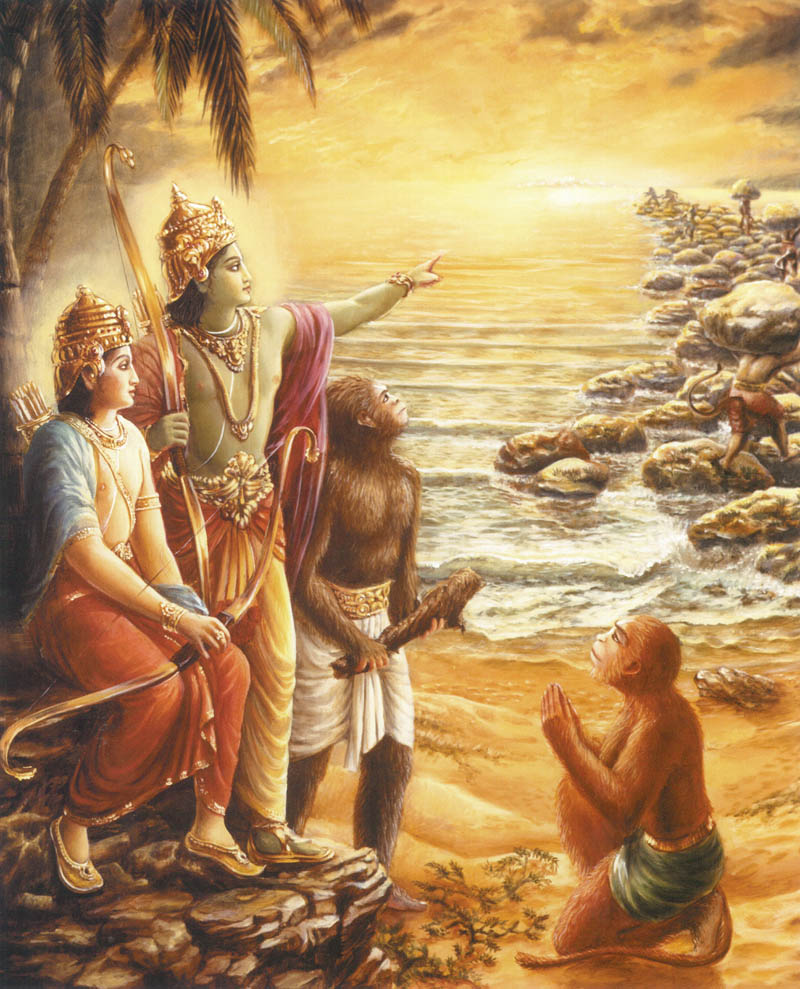 set fire, and all were finished. Then, Hanumān returned to Śrī Rāmacandra.
set fire, and all were finished. Then, Hanumān returned to Śrī Rāmacandra.
Now Rāmacandra, with the monkey army – Sugrīva, Jāmbavān, Nala, Nīla, and others – went to the ocean and made a bridge with the help of Nala and Nīla. Nala had a boon that whatever he would throw in the ocean would float. Thus, very soon the monkeys made a bridge and crossed it. There was a very great battle for ninety days, in which Rāvaṇa and his whole army were finished.
Then, Rāmacandra made Vibhīṣaṇa King of Laṅkā, and Vibhīṣaṇa brought Sītā-devī to Rāma there. But Rāma refused to take Sītā. [Although sages, demigods, and Rāma’s father appeared there and confirmed Sītā’s chastity] He told Her, “I cannot accept you. You can go anywhere you like.” Sītā-devī then told Lakṣmaṇa, “Build a fire for me. I will burn; I will not keep my body.” Lakṣmaṇa then made a huge fire, and Sītā-devī entered that. This was only a trick because in Daṇḍakāraṇya, Rāma had given Sītā-devī to the care of the deity of fire. Now, by a trick, Rāma took Sītā-devī from the fire. He went to Ayodhyā with Sītā, Lakṣmaṇa, Sugrīva, Hanumān, and others. Bharata was waiting there and went at once to greet Rāma. Rāma was then given the crown of Ayodhyā.
Bhagavān Śrī Rāmacandra, ki jaya!
Source: Purebhakti.com
Image(s) made possible by Pixabay.com, Krishnapath.org or Bhaktiart.net
Unless indicated differently, all verse translations and quotes are from the books by Śrīla Prabhupāda (Vedabase.com)